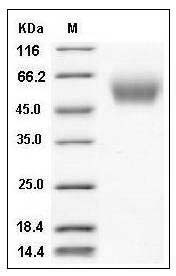-
Product Name
Human CEACAM8/CD66b/CD67 (His Tag) recombinant protein
- Documents
-
Description
CEACAM8, also known as CD66b or NCA-95, is a single chain, GPI-anchored, highly glycosylated protein belonging to the carcinoembryonic antigen family. There are four members in this family: CD66a, CD66b, CD66c, and CD66d. Members of CEACAM family are widely expressed especially on human neutrophils, and, depending on the tissue, capable of regulating diverse functions including tumor promotion, tumor suppression, angiogenesis, and neutrophil activation. Abnormal overexpression and downregulation of some CEACAMs have been described in tumor cells. Monoclonal antibodies grouped in the CD66 cluster recognize CEACAM members. Ectopic CD66 expression is commonly detected in B-cell lineage acute lymphoblastic leukemia (ALL). CEACAM8(CD66b) is also an activation marker for human granulocytes. However, its biological functions are largely unknown in eosinophils. It has been reported that CD66b is highly expressed on the surface of human peripheral blood eosinophils isolated from healthy individuals. Engagement of CD66b by mAb or a natural ligand, galectin-3, activated a Src kinase family molecule, hemopoietic cell kinase (Hck), and induced cellular adhesion, superoxide production, and degranulation of eosinophils. CD66b molecules were localized in lipid rafts, and disruption of lipid rafts or removal of the GPI anchor inhibited the adhesion and activation of eosinophils. Importantly, CD66b was constitutively and physically associated with a beta2 integrin, CD11b, and cross-linking of CD66b induced a striking clustering of CD11b molecules. Thus, CD66b molecules are involved in regulating adhesion and activation of eosinophils, possibly through their localization in lipid rafts and interaction with other cell surface molecules, such as CD11b. Binding of exogenous or endogenous carbohydrate ligands(s) to CD66b may be important in the release of proinflammatory mediators by human eosinophils.
-
Protein name
cDNA FLJ51237, moderately similar to Carcinoembryonic antigen-related cell adhesion molecule 8
-
Protein short names
CEACAM8; NCA-95; CD66B; CD67; CGM6
-
Uniprot ID
Q0Z7S6
-
Source/Expression Host
Human Cells
-
Expression Plasmid/cDNA
A DNA sequence encoding the human CEACAM8 (NP_001807.2) without the pro peptide (Met 1-Ser319) was expressed, with a polyhistidine tag at the C-terminus.
-
Protein Species
Human
-
Molecular weight
The recombinant human CEACAM8 consists of 296 amino acids and predictes a molecular mass of 32.8 kDa. In SDS-PAGE under reducing conditions, the apparent molecular mass of rh CEACAM8 is approximately 55-60 kDa due to glycosylation.
-
Purity
> 96 % as determined by SDS-PAGE
-
Activity
1. Measured by its binding ability in a functional ELISA.
2. Immobilized human CEACAM6-his (Cat:504540) at 10 μg/mL (100 μl/well) can bind biotinylated human CEACAM8-his, The EC50 of biotinylated human CEACAM8-his is 0.17 μg/mL. -
Validations

Human CEACAM8 / CD66b Protein (His Tag) SDS-PAGE
Related Products / Services
Please note: All products are "FOR RESEARCH USE ONLY AND ARE NOT INTENDED FOR DIAGNOSTIC OR THERAPEUTIC USE"
